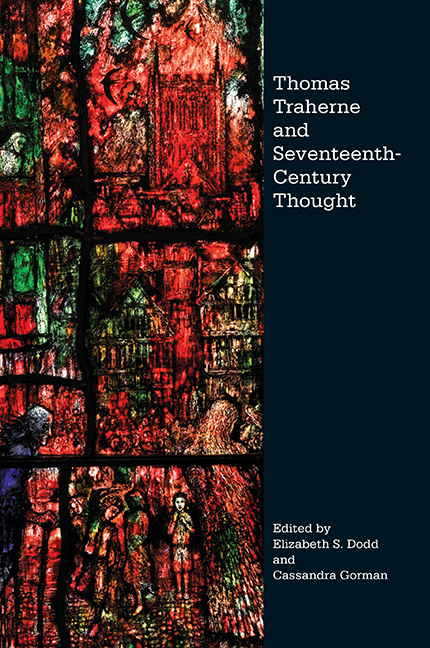Book contents
- Frontmatter
- Contents
- Contributors
- Acknowledgements
- Conventions and Abbreviations
- Foreword
- Introduction: ‘A lover of all Things … An Active ey’ (Select Meditations I.82): Traherne in Context
- PART I PHILOSOPHIES OF MATTER AND SPIRIT
- PART II PRACTICAL AND PUBLIC DEVOTION
- Afterword by Jacob Blevins
- Chronology of Traherne's Life and Contemporary Intellectual Developments
- Bibliography
- Index
- Index of Biblical References
- Studies in Renaissance Literature
Foreword
Published online by Cambridge University Press: 05 July 2016
- Frontmatter
- Contents
- Contributors
- Acknowledgements
- Conventions and Abbreviations
- Foreword
- Introduction: ‘A lover of all Things … An Active ey’ (Select Meditations I.82): Traherne in Context
- PART I PHILOSOPHIES OF MATTER AND SPIRIT
- PART II PRACTICAL AND PUBLIC DEVOTION
- Afterword by Jacob Blevins
- Chronology of Traherne's Life and Contemporary Intellectual Developments
- Bibliography
- Index
- Index of Biblical References
- Studies in Renaissance Literature
Summary
Traherne's persona as an author is almost entirely a creation of the twentieth century. The seemingly miraculous sequence of the rediscovery of his unpublished manuscripts over the century from 1897 to 1997, utterly divorced in both time and location from the context in which they were created, has from the first promoted ahistorical readings of his life and work. This tendency has been further reinforced by the fact that Traherne's literary reputation during the seventeenth century, based only on the publication of Roman Forgeries (1673) and Christian Ethicks (1675), was slight, and as a result there is a lack of contemporary comment on his writing, which might otherwise have guided interpretation of his work in relation to the current events that shaped it. The nature and content of the earliest manuscript discoveries, published as Poetical Works (1903), Centuries of Meditations (1908) and Poems of Felicity (1910), contributed to confirm the sense of temporal dislocation by at once defining as the key themes in Traherne's writing the re-creation of Adam in Eden, the celebration and loss of childhood innocence, the recovery of felicity, and the mystical experiences of solitude. These emotionally accessible images had a universal appeal, which made instantly perceived parallels with Blake, Wordsworth and Whitman seem more relevant than the historical context in which they were created. The lack of knowledge about Traherne himself and the difficulty of finding documentary evidence also meant that the poems and Centuries were immediately exploited as a source of biographical information, leading to over-literal and naive interpretations of his work, and in some cases to anachronistic and inaccurate assumptions about his life. Thus, within a few years of his rediscovery, the preoccupations that were to govern Traherne criticism for most of the next century had been established.
Literary criticism of Traherne is, however, as historically contingent as his own writing, and the persistence of these themes throughout the first decades of the twentieth century reflects more than the intrinsic qualities of the first manuscript discoveries. His poems and the Centuries were published during an era when to be a ‘joyful and happy soul’ did not seem impossible, and Edwardian critics were keenly responsive to the celebration of innocence and physical beauty.
- Type
- Chapter
- Information
- Thomas Traherne and Seventeenth-Century Thought , pp. xiii - xxPublisher: Boydell & BrewerPrint publication year: 2016

